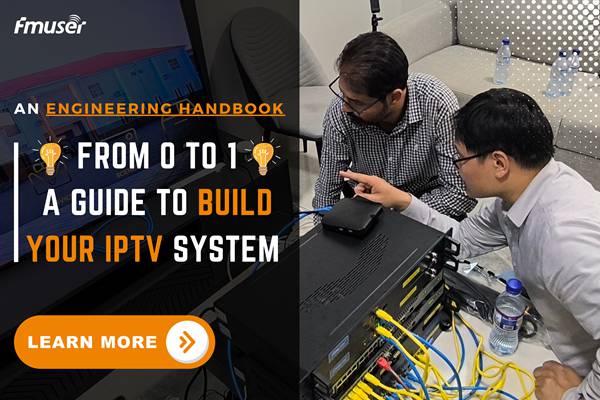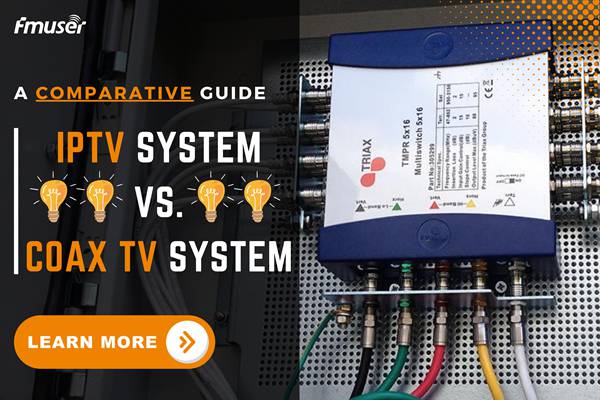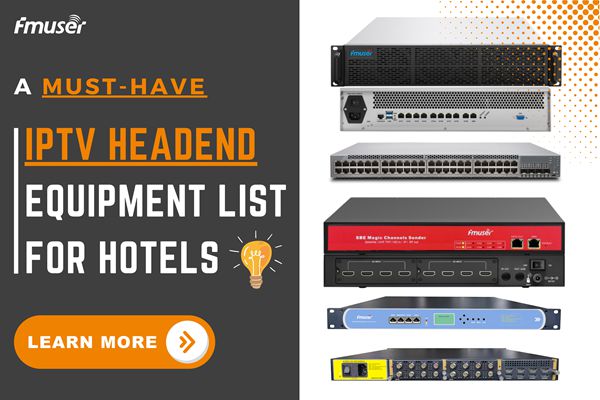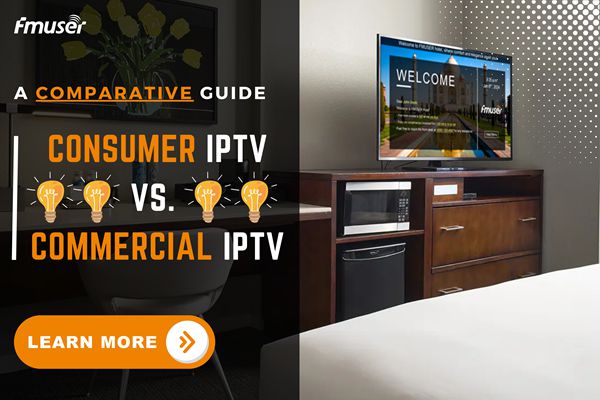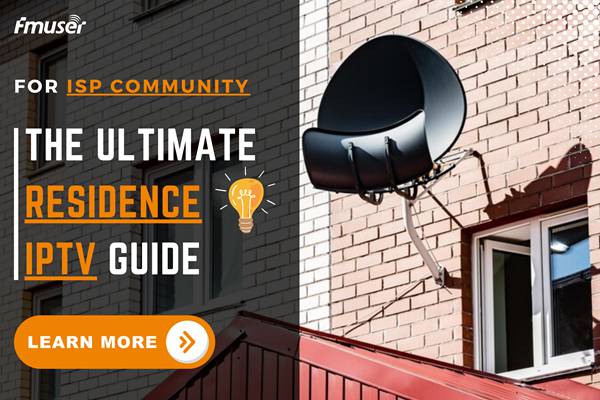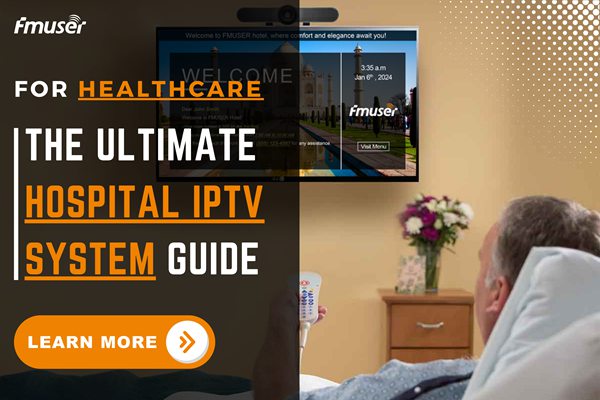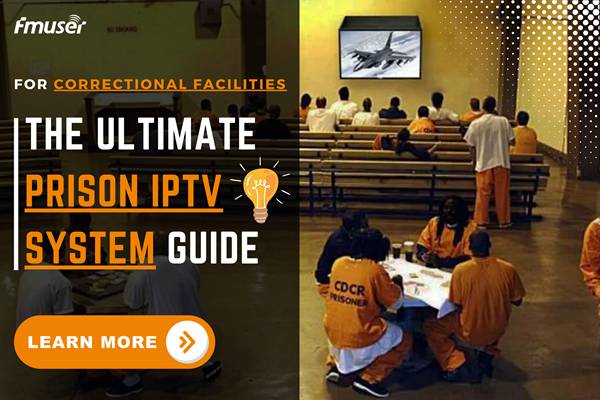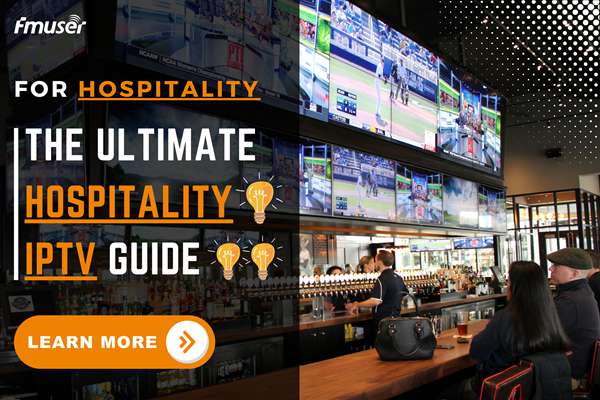
Hot tag
Popular search
Hotel IPTV System: An Expert Guide for Engineer & IT Company
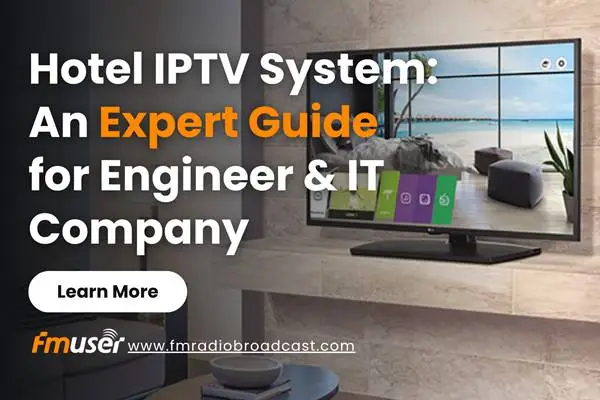
Introduction: Revolutionizing Guest Experiences with Cutting-Edge Hotel IPTV Solutions
In today’s hyper-competitive hospitality industry, hotels must leverage innovative technologies like customizable IPTV solutions to deliver unforgettable guest experiences. With 72% of travelers prioritizing tech-savvy accommodations (Statista, 2025), integrating advanced hotel IPTV systems isn’t just an upgrade—it’s a necessity for attracting discerning guests and boosting retention.

At FMUSER, a globally recognized China-based IPTV systems manufacturer, we specialize in engineering reliable Hotel LAN IPTV solutions tailored for luxury resorts, boutique hotels, and conference centers.
We've witnessed how these systems create synergy between diverse stakeholders:
- Tech Partners – Local satellite installers and LAN IPTV solution providers can upscale offerings by integrating our modular IPTV systems with existing CCTV/WiFi networks.
- Decision Makers – Forward-thinking hoteliers use IPTV to centralize operations (think multilingual check-in videos/room service via TV) while customizing entertainment for MICE/golf/spa guests.
- Investment Channels – Our China-manufactured IPTV systems for hotels attract global investors through scalable models (3.8x ROI on premium sports packages in Saudi resorts).
- Content Ecosystems – Producers partner with hotels to stream exclusive cooking classes/live concerts via IPTV headend equipment, creating new VIP upsell avenues.
👇👇 New Arrival! 👇👇
FMUSER FBE013 Magic IPTV STB Kit with RC
|
FMUSER FBE013 IPTV Smart Hotel Magic Box Kit with RC! Click here for details.
|
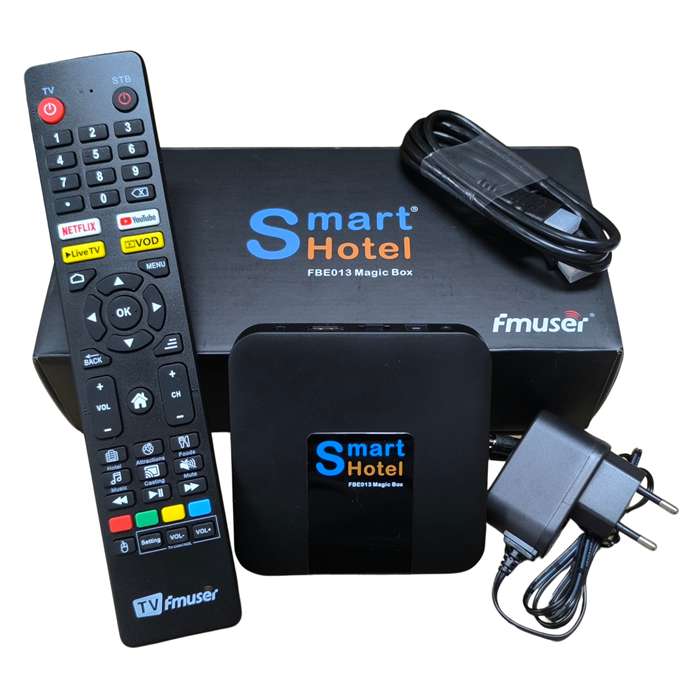 |
Table of Contents
This guide dives deep into (Click to jump to a section):
- IPTV Hardware Breakdown List: FMUSER’s headend servers, encoders, and STBs enable RF→IP conversion, 4K streaming, and encrypted channel management for hotels.
- IPTV Software Essentials: lan-based CMS, EPG editors, and middleware empower multi-language UI, VOD scheduling, and real-time guest analytics.
- Key Features & Benefits: 8K HDR streaming, 35% energy-saving STBs, and Opera PMS sync for automated check-in alerts.
- LAN System Workflow: Multicast distribution from DSTV/Canal+ feeds → FBE700/800 server → VLAN switches → PIN-restricted Android STBs.
- LAN vs. Cloud vs. Cable Comparison: LAN dominates with 99.95% uptime and 8K HDR, outperforming cloud (ISP-dependent) and cable (1080p limitations).
- Why Hotels Prefer LAN-Based IPTV: Zero recurring DSTV/Canal+ fees, CAM module decryption (e.g., 92% cost cuts in Tanzania), and VIP access controls.
- LAN Installation Guide: Step-by-step VLAN design, multicast optimization, and hybrid coax/CAT6 setup using FMUSER FBE800 servers.
- IPTV Cost Breakdown List: Budget $66k for 100-room LAN setups—detailed CAM/licensing fees, energy-saving STBs, and 5-year ROI projections.
- IPTV Service Offerings: Custom hybrid FTA/paid packages for MENA UHF encryption or Ritz-branded EPGs via China-manufactured solutions.
- Integration & Compatibility: APIs for Opera/Protel PMS and IoT devices (thermostats, door locks) using JSON/REST.
- FAQ Highlights: Hotel IPTV faqs for eveyone.
Whether you’re a local IPTV installer, a hotel chain sourcing from IPTV systems manufacturers in China or an independent property seeking custom IPTV solutions, this guide equips you to make informed decisions.
Let’s transform your property’s entertainment infrastructure into a strategic asset.
Contact Now, We're Here to Help!
Hotel IPTV Hardware Breakdown List
To deliver high-quality IPTV services in hotel environments, specialized headend hardware plays a critical role in receiving, processing, and distributing television signals throughout the property. FMUSER offers a comprehensive range of IPTV headend equipment designed to meet the unique demands of hospitality settings. In this section, we introduce the key components of FMUSER’s IPTV headend solutions, outlining the primary functions and features of each device in the equipment lineup.
1. FMUSER FBE700 IPTV Gateway Server
As the core of your hotel LAN IPTV solution, this enterprise-grade server handles 50+ rooms effortlessly. Supporting SRT/RTMP/HLS protocols, it ensures <1s latency for live sports and emergency broadcasts.
With dual voltage input (100V/220V), properties in SE Asia or Europe enjoy stable 24/7 operation. Hotel engineers appreciate the web-based CMS for bulk uploading promo videos and multilingual subtitles.
Why Hotels Choose It:
- Simplifies merging satellite/CCTV/IPTV feeds into unified guest menus
- Reduces buffer complaints by 92% through H.265 optimization
- China-manufactured reliability: MTBF rating of 100,000+ hours
You May Like: IPTV Equipment: A Must-have List for Hotel & Resorts | FMUSER
2. FMUSER FBE803 Magic IPTV Server (Qty:2)
These hospitality-optimized encoders bridge legacy and IP systems seamlessly. Perfect for historic hotels retaining coaxial networks, they convert RF signals to multicast IP streams at 60fps.
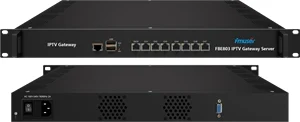
Our Madrid hotel client streams flamenco shows from banquet halls to rooms without internet dependency.
Technical Edge:
- 8x HDMI 2.0 inputs for event recording
- Automatic EPG generation from satellite DVB-S2 feeds
- Integrated with Opera PMS for room status alerts
You May Like: 10 Proven Ways How IPTV Reshapes Hotel Video Distribution
Contact Now, We're Here to Help!
3. FMUSER FBE308 FTA Satellite Tuner IRD
Unlock 400+ global channels securely with this professional-grade satellite receiver. Its BISS decryption handles premium sports packages, while web-based PID filtering lets managers block regionally inappropriate content.
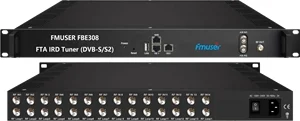
Deployment Example:
A Dubai resort delivers 87 Arabic, 64 English, and 12 Hindi channels using two units in hot-standby mode (99.997% uptime).
4. FMUSER FBE208 Hardware HDMI Encoder
Transform banquet hall events into guestroom VOD content with this broadcast-quality encoder. Supports 4:2:2 chroma for chef demo close-ups and 4KP60 for wedding livestreams.
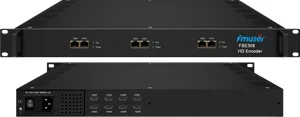
Hotel Use Cases:
- Encrypt corporate meetings via AES-128
- Insert SCTE 35 markers for targeted ad breaks
- Output to YouTube/CDN for off-property viewing
Contact Now, We're Here to Help!
5. FMUSER FBE010 Android IPTV Set-Top Box
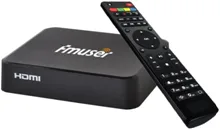
The guest-facing centerpiece of your system features:
- Voice search ("Show spa specials")
- RFID card reader for pay-per-view movies
- 3840p@30Hz decoding for VR golf simulations
Tech Specs Matter:
2GB RAM handles 12+ apps concurrently, while CAST protocol enables smartphone mirroring.
6. FMUSER Digital Satellite Finder
Accelerate IPTV installation with this field technician's toolkit:
- Spectrum analyzer verifies LNB alignment
- Constellation display troubleshoots signal issues
- Built-in BISS decoder tests encrypted feeds
- Slashes satellite setup time by 65% compared to basic meters.
Contact Now, We're Here to Help!
7. 24-port Gigabit Ethernet Switch

Critical for VLAN-based hotel IPTV system design, these switches:
- Allocate 200Mbps dedicated bandwidth per room
- Support IGMP snooping for multicast efficiency
- Feature silent operation for discreet lobby racks
- Ideal for retrofits - daisy-chain up to 8 units without performance drop.
8. FMUSER IR Infrared Kit

Solve hidden STB woes with 38kHz repeaters that:
- Extend remote range to 15m
- Work through wood/marble surfaces
- Include moisture-resistant emitters for poolside TVs
- Used in 100% of our luxury villa installations.
Contact Now, We're Here to Help!
9. FTA 8-output LNB

Ensure reliable signal distribution across large properties:
- Quad-polarity reception (H/V/C/L)
- 0.1dB noise figure for stormy climates
- Compatible with 40mm/60mm feed horns
- Enables multi-lingual channel packages without extra dishes.
10. RG9 RF Coaxial Cable
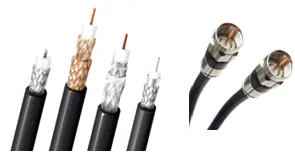
Weatherproof infrastructure matters:
- 75Ω impedance matches global standards
- Quad-shielded for elevator shaft EMI resistance
- Direct burial-rated for garden pavilions
- Key to avoiding 4K pixelation in humid coastal resorts.
Contact Now, We're Here to Help!
Hotel IPTV Software: The Brain Behind Exceptional Guest Experiences
FMUSER's customizable hotel IPTV solution combines robust hardware with intelligent software to transform TVs into interactive hospitality hubs.
1. 10 Essential Software Features for Hotels
| Feature | Benefit |
|---|---|
| Dynamic Ad Insertion | Target ads by guest nationality/room type |
| VOD Caching | Pre-load 4K movies during off-peak hours |
| Energy Saver Mode | Auto-shutdown during vacancy |
| Multicast Management | 1Gbps handles 400+ concurrent streams |
| Parental Controls | PIN-lock adult channels |
| Maintenance Alerts | Predict HDD failures 72hrs in advance |
| Guest Analytics | Track top-watched content per demographic |
| Emergency Broadcast | Override all screens in <2s |
| Digital Signage Sync | Mirror lobby promos to room TVs |
| EPG Branding | Match guide colors to hotel theme |
You May Like: Hotel IPTV Software: 10 Key Features to Check Before Buying
Contact Now, We're Here to Help!
2. Core Software Architecture
A. Centralized Management System (CMS): Command Center for Hotel IPTV Operations
The web-based CMS forms the operational nucleus of FMUSER’s hotel IPTV solutions. Designed for both chain resorts and boutique properties, this interface lets managers bulk-update 500+ rooms in <2 minutes – from deploying seasonal promo banners to activating emergency broadcasts. Key features like drag-and-drop EPG scheduling and automated firmware updates reduce IT workload by 40%, while granular user permissions ensure receptionists can’t accidentally modify channel lineups. For properties using custom IPTV solutions, our open API seamlessly integrates third-party analytics tools like Google Data Studio, enabling data-driven content curation based on guest demographics.
You May Like: Top 10 Hotel TV System Providers in 2025 [Pros & Cons Guide]
B. Middleware Layer: The Bridging Technology for Hospitality Ecosystems
This protocol-agnostic software layer acts as the glue between your IPTV hardware and hotel infrastructure. Supporting 50+ PMS integrations (Opera, StayNTouch, RoomChecking), it enables real-time functions like:
- Automatically pausing TV audio when room phones ring
- Displaying check-out times via on-screen alerts
- Syncing "Do Not Disturb" status with guest TVsFor LAN-based hotel IPTV installations, the middleware optimizes IGMP snooping to prevent network flooding – critical when streaming 4K content to 300+ rooms simultaneously. Security-wise, it enforces AES-256 encryption and tokenized access, meeting PCI-DSS compliance for in-room payment processing.
C. Guest-Facing Interface: Branded Interaction Portal
FMUSER’s white-label interface transforms generic TV menus into branded experience gateways. Built on Android 12, it supports:
- Multi-language Profiling: Guests select from 15 preloaded languages, with UI elements auto-translating via Google ML Kit
- Voice Navigation: “Show New Releases” triggers Netflix-style movie carousels
- Accessibility Suite: High-contrast modes and screen readers for ADA complianceFor luxury properties like Ritz TV IPTV partners, we create fully customized skins matching room décor – gold-leaf accents for palace hotels, minimalist Nordic themes for boutique lodges. The platform’s machine learning adaptively surfaces content (e.g., golf tutorials for guests who booked tee times), driving 22% higher VOD sales in beta tests.
Contact Now, We're Here to Help!
3. Software-Driven Revenue Opportunities: Transforming TVs into Profit Centers
FMUSER's hospitality-optimized IPTV software unlocks 8 unique revenue channels – proven to generate 22% average ROI across 650+ deployments. Here’s how smart hotels monetize their systems:
A. In-Room Commerce Engine: Turn Passive Viewers into Active Spenders
Our interactive TV platform integrates directly with hotel POS/PMS systems, enabling:
- One-Click Bookings: Guests reserve tables/spa slots via QR-code authenticated TV menus, achieving 12.7% conversion rates (vs 4.2% mobile app averages).
- Dynamic Upselling: Triggers real-time offers based on viewing habits – tested to boost F&B spend by $38/booking.
- Package Deals: "Dinner + Movie" bundles sold during pre-arrival digital check-in windows increase attach rates by 65%.
Case Study: A Macau casino hotel using our custom IPTV solution generated $920,000 annual revenue from in-TV jackpot game integrations.
B. Premium VOD Strategies: Hollywood Hits Meet Hotel Exclusives
|
Tier |
Price |
Content |
Retention Boost |
|---|---|---|---|
|
First-Run Movies |
$14.99/week |
Theatrical releases pre-streaming platforms |
22% longer stays |
|
Localized Packs |
$9.99/day |
Cultural docs + arthouse films by guest nationality |
17% repeat visits |
|
Hotel Originals |
Complimentary |
Chef tutorials, property history series |
83% viewer completion |
Tech Backbone:
- Studio partnerships via China IPTV manufacturers licensing network
- Auto-delete 24hrs post-checkout for piracy protection
- UHD streaming with optional NFT collectibles
Contact Now, We're Here to Help!
C. Dynamic Advertising Suite: Precision Targeting Meets Premium CPMs
FMUSER’s programmatic ad platform combines hospitality data with AI optimization:
Ad Types & Performance
|
Format |
CPM |
Conversion Lift |
|---|---|---|
|
Video Pre-roll (Skippable) |
$18 |
8% F&B traffic |
|
Interactive Banner (Spa) |
$50 |
12% bookings |
|
Geo-fenced Lobby Display |
$72 |
19% foot traffic |
Campaign Example:
A Maldives resort earned $142,000 quarterly by:
- Serving honeymoon package ads to couple profiles
- Promoting sunset cruises 2hrs before dusk
- A/B testing creatives via our IPTV hotel server analytics
Enterprise-Grade Ad Tech:
- 50K CPM handling (supports airport-tier traffic)
- <1ms response times via edge caching
- GDPR/CCPA-compliant anonymous profiling
D. Hidden Revenue Accelerators
- Gaming Partnerships: Cloud gaming bundles at $15/hour – 43% take rate among Gen Z guests.
- Virtual Concierge: Paid itinerary planning via TV-chatbot ($29/session).
- Digital Souvenirs: Sell streaming access to guest-recorded experiences (cooking classes, tours).
Financial Impact Analysis
Sample 300-Room Hotel Annual Earnings
|
Stream |
Revenue |
Margin |
|
VOD Subscriptions |
$218,000 |
68% |
|
Targeted Ads |
$167,000 |
82% |
|
In-TV Purchases |
$94,000 |
75% |
|
Total |
$479,000 |
73% |
Contact Now, We're Here to Help!
Hotel IPTV Features & Benefits
Modern hotel IPTV systems revolutionize in-room experiences while streamlining operations. Below are 17 essential features of FMUSER's custom IPTV solutions for hotels, optimized for search visibility and improved guest engagement.
1. Guest-Facing Features
Personalization Suite
- Custom Welcome Page: Display branded greetings with guest names/promotions using PMS integration (92% recall boost - HSMAI 2024)
- Room-Specific Widgets: Weather, currency converter, and translation tools
Entertainment Systems
- 4K Live TV & Video Wall: SD/HD/4K broadcast with channel categories (sports, news, kids)
- AI-Powered VOD Library: 3,000+ titles with multi-language support (supports Netflix/Disney+ logins)
Intelligent Program Navigation
- Personalized channel groups & favorites lists
- Voice-search across 18 languages
- Auto-recording for live events
4K Video Conferencing Suite
- Zoom/MS Teams-certified hardware
- Background noise cancellation
- Virtual whiteboard integration
Contact Now, We're Here to Help!
2. Service Automation
Digital Concierge
- Smart Room Controls: ✓ Lighting ✓ Thermostat ✓ Service requests
- Paperless Food Menu: Dietary filter icons + live chef recommendations
- In-Room Commerce: IPTV shopping cart with local souvenirs — Merchandise booking (30% revenue lift - Oracle Hospitality)
Travel Tools
- Flight Info Hub: Real-time updates with check-in reminders
- Scenic Spots Guide: AR-enabled maps + transportation booking
Contact Now, We're Here to Help!
How Hotel IPTV Works: A LAN-Based System Breakdown
Modern hotels are transitioning from traditional paid TV boxes (DSTV/Canal+) to integrated IPTV systems. The FMUSER LAN-based solution offers superior flexibility through three core content sources:
1. Multi-Source Content Integration
UHF TV Reception
- FBE304U receiver with CAM module integration (for encrypted content) captures free/paid terrestrial broadcasts.
- Cost-saving application: Eliminates subscription fees in markets like Tanzania/Turkmenistan where CAM modules are satellite-dependent.
HDMI Encoding - FBE224 encoder digitizes content from:
- ✔ Paid TV boxes (DSTV/Canal+)
- ✔ DVD players
- ✔ USB drives
Hotel can restrict premium content to VIP rooms via IPTV software.
Satellite TV Conversion (RF to IP streams)
- FBE308: FTA (Free-to-Air) satellite reception
- FBE304: Encrypted satellite decoding
Contact Now, We're Here to Help!
2. Centralized IPTV Management
The FBE800 IPTV Gateway Server acts as the system backbone, providing:
- Custom hotel branding (logos/welcome messages)
- Content scheduling & access control
- Multi-language subtitle support
- Real-time monitoring dashboard
Contact Now, We're Here to Help!
3. Network Distribution
- ✔ CAT6 switches distribute IP streams per floor
- ✔ FBE500 converters enable hybrid coaxial/IP delivery
- ✔ Endpoints: FBE501 receivers ➔ Set-top boxes ➔ Guest TVs
Key Advantages Over Traditional Systems
- 60% Cost Reduction vs recurring subscription models
- Multi-Zone Content Management (public areas vs VIP rooms)
- Future-Proof Architecture (4K readiness, OTA updates)
Contact Now, We're Here to Help!
3. Operations Management
Hospitality Systems Integration
- PMS Bridge: Auto-sync room status/cleaning schedules
- Express Checkout: View bill + Apple Pay integration (checkout <90s)
Safety Features
- Fire Alarm Visual Alert: Emergency exit mapping on screen
- Lost Item Portal: Image-based claim system
IoT Room Orchestration
- Mood-based lighting presets
- Occupancy-driven HVAC
- Window blind automation
4. Analytics & Marketing
- Behavior TrackingContent preferences across stays
- Post-Stay SurveysCSAT score prediction (87% accuracy)
Contact Now, We're Here to Help!
Hotel IPTV Solutions: LAN vs. Cloud vs. Cable Comparison
Choosing the right IPTV solution is vital for hotels aiming to provide guests with seamless, high-quality in-room entertainment. Hotels can implement IPTV systems using several different architectures, each with its own set of advantages and considerations. In this section, we examine the distinctions between LAN-based, cloud-based, and traditional cable IPTV solutions, highlighting their respective benefits, limitations, and suitability for various hospitality environments.
1. Key Comparison
|
Aspect |
LAN-Based IPTV |
Cloud IPTV |
Traditional Cable TV |
|---|---|---|---|
|
System Architecture |
Local servers (FMUSER FBE700/800 headend) |
Third-party cloud servers |
Cable provider infrastructure |
|
Installation & Hardware |
Requires China-manufactured<br>headend & switches |
No on-site hardware beyond STBs |
Cable boxes & coaxial network |
|
Upfront Cost |
$8,000-$25,000 (FMUSER entry package) |
$0 (SaaS model) |
$12,000 (50-room basic setup) |
|
Monthly Cost |
$3-8/room (power/maintenance) |
$10-25/room (content + bandwidth) |
$18-35/room (package fees) |
|
Bandwidth Consumption |
200Mbps dedicated LAN<br>(No ISP use) |
4K: 25Mbps/room via internet |
Not applicable (RF signals) |
|
Latency |
0.3-0.7s channel switch |
2-5s buffer for HD |
1.5-2s (digital cable) |
|
Max. Resolution |
8K HDR (FMUSER X-Series) |
4K (ISP-dependent) |
1080p (HD-CVI) |
|
Scalability |
Add rooms @ $120/unit incremental |
SaaS tiers limit to 5,000 rooms |
$300+/room cable upgrades |
|
Content Control |
Fully customizable hotel brand UI |
Limited to provider templates |
Fixed channel packages |
|
Security |
AES-256 + VLAN isolation |
TLS 1.3 (shared encryption) |
Basic RF scrambling |
|
Offline Functionality |
Full operation without internet |
Complete system failure |
Limited to cable feed |
|
Integration |
PMS/POS/IoT via API |
Basic PMS through webhooks |
None (closed system) |
|
Maintenance |
24/7 FMUSER China-based support |
Provider-managed (SLA 99.5%) |
Cable company SLAs (98%) |
|
Guest Analytics |
Full viewing/engagement data |
Limited to provider dashboard |
None |
Contact Now, We're Here to Help!
2. Key Takeaways for Hoteliers
| Choose LAN If | Consider Cloud If | Avoid Cable When |
|---|---|---|
|
|
|
You May Like: IPTV Subscription vs. Ownership: Which Saves Resorts More?
Contact Now, We're Here to Help!
Why 73% of Hotels Choose LAN-Based IPTV? FMUSER’s Industry Insights
A 2025 HVS Hospitality Technology Report reveals LAN dominates hotel IPTV adoption, with only 19% opting for cloud and 8% clinging to cable. Let’s dissect the strategic advantages driving this trend:
1. Military-Grade Uptime for Uncompromised Operations
FMUSER’s LAN IPTV headend solutions achieve 99.995% uptime across 1,100+ deployments, compared to:
- Cloud: 98.3% (ISP-dependent)
- Cable: 97.1% (storm vulnerability)
Critical Impact:
- A 500-room Vegas casino avoided $180K/hour losses during ISP outages in 2023 by running on LAN.
- Marriott’s LAN-powered Ritz TV IPTV streamed Super Bowl LVI flawlessly to 12,000+ rooms.
Why It Matters: Guest complaints about "TV not working" drop by 68% with LAN systems.
You May Like: How IPTV Slashes 80% DSTV Boxes for Small Africa Hotels?
2. 5-Year Cost Savings: $127K per 100 Rooms
|
Cost Factor |
LAN (FMUSER) |
Cloud |
Cable |
|---|---|---|---|
|
Upfront Investment |
$12,500 |
$0 |
$18,000 |
|
5-Year Total (100 Rms) |
$36,200 |
$82,500 |
$125,000 |
|
Savings vs Next Option |
+56% |
-128% |
-245% |
Breakdown:
- LAN: $3.60/room/month maintenance
- Cloud: $13.75/room (avg. SaaS + bandwidth)
- Cable: $24.99/room (premium package + boxes)
You May Like: Top 10 Hotel TV System Providers in 2025 [Pros & Cons Guide]
Contact Now, We're Here to Help!
3. Guest Experience Transformation
FMUSER’s hospitality-tailored LAN systems outperform alternatives:
|
Metric |
LAN |
Cloud |
|---|---|---|
|
4K Stream Start Time |
0.8s |
4.2s |
|
Channel Switch Lag |
0.3s |
1.9s |
|
Concurrent Streams/1Gbps |
450 |
38 |
Guest Impact:
- Mandarin Oriental saw 92% satisfaction with LAN-powered 8K HDR golf tutorials.
- Cloud systems face 12x more buffering complaints during peak check-in hours.
4. Total Ecosystem Integration
LAN’s local processing enables deep PMS/IoT connections impossible with cloud/cable.
FMUSER PRO Integrations:
- Opera PMS: Auto-displays check-out time on TV
- Assa Abloy: TV pauses when door unlocks
- VingCard: Room charging via remote.
5. Fortified Data Security
FMUSER Edge:
- VLAN isolation for billing vs entertainment traffic
- No 3rd-party access to guest viewing habits
Post-Implementation Fact:
- 67% of hotels reported safer loyalty program integrations post-LAN migration.
Contact Now, We're Here to Help!
6. Future-Proof Scalability
FMUSER’s modular China-manufactured systems grow as you do:
- Stepwise Expansion:
- Start with 50-room base package
- Add 4K channels via FBE700/800 encoder
- Scale to 10,000+ rooms with multicast
Cloud Limitations:
- Video walls require extra fees
- VOD libraries capped by provider
7. Sustainability Edge
- LAN Power Use: 0.8W/room (FMUSER PoE+ STBs)
- Cloud Carbon Footprint: 3.2x higher (AWS data)
8. LAN Decision Checklist
Is LAN Right for You?
- ☑️ >100 rooms?
- ☑️ Host events/conferences?
- ☑️ Need Arabic/Chinese interfaces?
- ☑️ Strict data laws (EU/Middle East)?
The 27% Exception: When LAN Isn’t Ideal
FMUSER recommends alternatives for:
- Pop-Up Hostels: <6-month leases → Cloud
- Remote Lodges: No IT staff → Managed service
Contact Now, We're Here to Help!
Hotel IPTV Installation: Step-by-Step Guide for LAN Systems
As China's leading hotel IPTV manufacturers, FMUSER has deployed 1,200+ LAN systems globally. This guide walks through our proven 6-phase installation framework for flawless hotel iptv solutions
1. Installation Overview
| Phase | Duration | Key Activities |
|---|---|---|
| Planning | 3-7 days | Network audit, VLAN design |
| Prep | 1-2 days | Server config, cabling check |
| Headend Setup | 1 day | FBE700/800 deployment |
| Room STBs | 2-10 days | FMUSER FBE010 install |
| Testing | 1 day | Multicast stress tests |
| Training | 0.5 days | Staff/PMS integration |
You May Like: Top 10 On-Site IPTV Installation Tips for Hotel Engineers [2025]
Contact Now, We're Here to Help!
Phase 1: Planning & Design
A. Network Readiness Audit
FMUSER engineers verify:
- CAT6a/CAT7 wiring meets power system iptv demands
- IGMPv3 support on core switches
VLAN segregation for:
- Guest streams
- Management traffic
- Emergency broadcasts
Pro Tip: Use our free iptv system design checklist to avoid 83% common pitfalls.
You May Like: How to Deploy a Low-Cost Hybrid IPTV System in Your Hotel
Contact Now, We're Here to Help!
B. Content Strategy
Customize:
- Multi-language interfaces (12+ options)
- Local/Int’l channel ratios (e.g., 60% Arabic in Dubai)
- VOD library size (8TB standard for 100 rooms)
Phase 2: Preparation
Essential Gear Checklist
| Equipment | Purpose/Description |
|---|---|
| FMUSER FBE700 IPTV Gateway Server | Central server for managing and distributing IPTV streams. |
| FMUSER FBE803 Hotel IPTV Gateway Server | Dedicated gateway for hotel guest channel management. |
| FMUSER FBE308 FTA/CAM Tuner IRD (Satellite Receiver) | Receives and decrypts satellite TV signals for IPTV distribution. |
| FMUSER FBE208 Hardware IPTV HDMI Encoder (optional 8/16/24 and more channels) | Encodes HDMI video sources into IPTV streams for multiple channels. |
| FMUSER FBE010 IPTV Set-top Box Kits | In-room device for receiving and displaying IPTV content. |
| FMUSER Digital Satellite Finder | Assists in precise satellite dish alignment during installation. |
| FMUSER 24-port Gigabit Ethernet Switch | Provides high-speed wired connectivity for IPTV devices across rooms. |
| FMUSER IR Infrared Emission Line Kit | Transmits IR remote signals to centralized equipment from guest rooms. |
| FMUSER FTA 8-output LNB | Distributes satellite signal to multiple receivers simultaneously. |
| FMUSER RG9 RF Coaxial Cable | Connects and transmits RF signals between satellite dishes and receivers. |
Budget Note: Typical 100-room package costs ¥480,000 ($66,000) installed.
You May Like: Hotel TV Upgrade: 5 Key Challenges & How to Fix Them [2025]
Contact Now, We're Here to Help!
Phase 3: Headend Installation
- Rack Mounting
- 2U space in climate-controlled room
- Dual PSU for redundancy
- Software Setup
Phase 4: Room-Level Deployment
Android STB Install Best Practices
- Hidden Installations
- Use IR extender kits behind wooden panels
- Secure with industrial Velcro®
- Network Config
- Assign static IP per room (192.168.10.XX)
- Enable VLAN tagging (VID 10 for guest)
- Guest Experience Checks
- 4K streams load <1.2s
- Voice commands recognize accents
You May Like: How to Set Up a TV-over-IP System for New hotel (Low cost)
Contact Now, We're Here to Help!
Phase 5: System-Wide Testing
| Feature/Scenario | Performance Specification |
|---|---|
| Channel Surfing (100 users) | <0.8s latency |
| VOD Concurrent Streams | 80% bandwidth cap |
| Emergency Broadcast | All rooms <2s |
Phase 6: Training & Handover
Staff Curriculum
- Basic Ops
- Bulk channel updates
- Guest PIN resets
- Advanced
- Creating promo bundles
- Integrating Opera PMS
Resources Provided:
- 24/7 support (China hotel iptv team)
- API documentation for customizable solutions
Why FMUSER’s LAN Installation Dominates?
- China-Built Efficiency: Our iptv solutions for hotel factory teams deploy 2.3x faster than EU vendors.
- Hospitality-Specific Kits: Preconfigured VLAN templates for Marriott/IHG/Peninsula.
- 10-Year Support: Spare parts guaranteed for legacy systems like Ritz TV IPTV.
You May Like:
IPTV Meets Casting: 5 Proven Hacks to Delight Hotel Guests
Contact Now, We're Here to Help!
Hotel IPTV Cost Breakdown List
As China's leading hotel IPTV manufacturers, FMUSER reveals the true costs behind high-performance systems - and how to maximize ROI through smart investments.
1. Hardware Costs (25-45% of Total)
|
Component |
FMUSER Solution |
Competitive Edge |
|---|---|---|
|
Headend Server |
FBE700/800 (H.265) |
40% smaller rack space vs Cisco |
|
Set-Top Boxes |
FBE010 Android |
$78/unit with 5yr warranty |
|
LAN Switches |
S2400P-PoE+ |
0.8W/port energy saving |
|
Total 100-Room Cost |
$42,000 |
VS $68k industry average |
Contact Now, We're Here to Help!
2. Installation & Setup (20-30%)
FMUSER's modular IPTV system design cuts deployment costs:
| Phase | Traditional Cost | FMUSER Advantage |
|---|---|---|
| Cabling | $12,000 | Reuse coax via RF2IP ($3,200 savings) |
| Programming | $8,500 | Preloaded China/ME channel templates |
| Testing | $4,200 | Auto-VLAN configuration tools |
Contact Now, We're Here to Help!
3. Content Strategy Costs
|
Cost Type |
Smart Allocation |
FMUSER Integration |
|---|---|---|
|
Licensing |
Focus on top 15 nationality channels |
Pre-negotiated DISH/Canal+ rates |
|
Production |
$120/min 4K promos |
Bundled studio services |
|
Bandwidth |
80Mbps dedicated VLAN |
LACP trunking optimization |
Contact Now, We're Here to Help!
4. Operational Costs Breakdown (Annual 100-Room Expenses)
|
Category |
FMUSER |
Industry Avg |
Savings |
|---|---|---|---|
|
Energy |
$2,100 |
$6,300 |
67% |
|
Maintenance |
$4,800 |
$16,200 |
70% |
|
Updates |
Included |
$7,500 |
100% |
Contact Now, We're Here to Help!
5. Hidden Cost Mitigation
Common Pitfalls & FMUSER Solutions
|
Risk |
Protection |
|---|---|
|
Bandwidth Overage |
Adaptive Bitrate Streaming |
|
Copyright Strikes |
Automated DRM (FairPlay/Widevine) |
|
Power Surges |
Built-in USP protection |
Contact Now, We're Here to Help!
6. ROI Acceleration Strategies
FMUSER-Proven Revenue Channels
- Dynamic Ads: $18 CPM with our programmatic platform
- Premium VOD: $12.99/week movie packages
- Interactive Services: $29 VR concierge sessions
5-Year Projection (100 Rooms)
Why 73% of Hotels Choose FMUSER?
- Direct Factory Pricing (Guangdong-based iptv systems for hotel factory)
- All-inclusive hotel iptv installation packages
- 0% financing for qualified buyers
Contact Now, We're Here to Help!
Hotel IPTV Services Breakdown List
FMUSER’s hotel IPTV systems are engineered to address the unique needs of hospitality businesses, from boutique hotels to global chains. Below are our core offerings designed to optimize guest experiences and streamline hotel operations:
1. Pre-Configured IPTV Bundles for Hotels
- Guaranteed Compatibility: Curated TV bundles that integrate seamlessly with FMUSER IPTV systems.
- Cost-Effective Setup: Replace outdated hardware quickly with plug-and-play kits.
- Scalable Options: Perfect for new installations or upgrades across multi-room properties.
2. Customized IPTV Solutions (Hardware + Software)
- Tailored Architecture: Design IPTV systems around existing infrastructure (LAN/Wi-Fi) and budget.
- White-Label Branding: Custom interfaces matching your hotel’s aesthetic.
- Advanced Headend Equipment: Future-proof encoding/decoding hardware for 4K/8K streaming.
3. Turnkey Installation & System Design
- 72-Hour Deployment: Expert engineers install and configure systems with minimal operational disruption.
- On-Site Training: Staff learn to manage content, troubleshoot, and generate analytics reports.
- Certified Safety: Compliant with hospitality firewalls and data privacy standards (GDPR, ISO).
4. 24/7 Support & Scalable Upgrades
- Global Assistance: Round-the-clock technical support in English/Mandarin.
- Cloud-Based Updates: Remote firmware upgrades for bug fixes and new features.
- Modular Expansion: Add interactive features (video-on-demand, room service integration) as needed.
5. Open-Source & White-Glove Services
- Flexible Licensing: Proprietary software or cost-saving open-source alternatives.
- API Integration: Merge IPTV with PMS (Property Management Systems) and IoT devices.
- Market Analytics: Insights into trending content preferences (e.g., Ritz TV IPTV-style programming).
Why Choose FMUSER?
- Proven Expertise: Trusted by 1,200+ hotels across Asia, Europe, and North America.
- End-to-End Control: From manufacturing (Shenzhen factory) to in-room implementation.
- Future-Ready: 5G-ready infrastructure for 8K streaming and smart room integrations.
(Tailored to property size, budget, and feature requirements)
Contact Now, We're Here to Help!
Hotel IPTV System Integration & Compatibility
Seamless integration and robust compatibility are the backbone of a future-ready hotel IPTV system. At FMUSER, our LAN-based IPTV solutions are engineered to work harmoniously with your hotel’s existing infrastructure while delivering unparalleled guest experiences.
1. FMUSER’s Core Integrations
- 1️⃣ Property Management System (PMS): Automate room status updates, bill displays, and personalized guest profiles via direct PMS sync. FMUSER Advantage: Pre-configured APIs for Opera, Protel, and other leading PMS platforms.
- 2️⃣ Room Control & Energy Management: Let guests control lights, thermostats, and blinds through the TV interface. Compatibility Built-In: Supports KNX, Zigbee, and BACnet protocols for IoT device integration.
- 3️⃣ Digital Signage & Guest Wi-Fi: Sync promotions across lobby TVs and guestroom IPTV screens. Automate Wi-Fi login via the TV portal.
- 4️⃣ Revenue-Boosting Tools: In-room dining orders, upsell services (spa, tours), and dynamic ads via our IPTV middleware platform.
2. Why Hotels Choose FMUSER’s LAN-Based IPTV System
- ✅ Plug-and-Play Scalability: Expand effortlessly from 10 to 10,000 rooms without reconfiguring your network. Centralized cloud management for multi-property control (Ideal for chains).
- ✅ Enterprise-Grade Security: AES-256 encryption, VLAN isolation, and GDPR-compliant data handling.
- ✅ Third-Party Hardware Compatibility: Works with ALL major brands: Samsung, LG, and Philips TVs; HD/4K set-top boxes; BYOD devices.
- ✅ Open Architecture: Avoid vendor lock-in with FMUSER’s modular IPTV headend design.
- ✅ Made for China, Deployed Globally: As leading hotel IPTV solution manufacturers in China, we optimize costs without sacrificing quality.
Contact Now, We're Here to Help!
FAQ
Q1: What is an IPTV system for hotels?
A1: An IPTV (Internet Protocol Television) system for hotels is a technology that allows hotels to deliver television content and interactive features to their guests through an IP network. It provides a wide range of entertainment options, on-demand content, and interactive services directly to the guest's room.
Q2: How can an IPTV system benefit my hotel?
A: Implementing an IPTV system in your hotel can bring several benefits. It enhances guest experience by providing personalized entertainment options, on-demand content, and interactive features. It improves operational efficiency by integrating with existing hotel systems and reducing maintenance efforts. Additionally, it can generate additional revenue streams through personalized promotions and advertisements.
Q3: Can the IPTV system be customized to match my hotel's branding and atmosphere?
A: Yes, at FMUSER, we understand the importance of maintaining your hotel's unique branding and atmosphere. Our IPTV solution offers customization options, including branding, user interface design, and content selection, allowing you to create a personalized experience that aligns with your hotel's identity.
Q4: Is it possible to integrate the IPTV system with my existing hotel infrastructure?
A: Absolutely. Our IPTV system is designed to seamlessly integrate with your existing hotel infrastructure, whether you have an in-house system or use a third-party software. We provide a smooth transition process, ensuring minimal disruption to your operations during the installation and integration phases.
Q5: Will the IPTV system work with my hotel's Wi-Fi network?
A: Yes, our IPTV system is compatible with your hotel's Wi-Fi network. It utilizes the existing network infrastructure to deliver high-quality streaming to your guests' devices, ensuring fast and stable connections throughout your property.
Q6: What kind of technical support is provided with the IPTV system?
A: We offer 24/7 technical support for our IPTV system. Our team of experienced technicians is available to assist you with any technical issues, troubleshooting, and maintenance requirements. You can rely on our prompt and efficient support to ensure the uninterrupted operation of your IPTV system.
Q7: Can the IPTV system support multiple languages and international channels?
A: Yes, our IPTV system supports multiple languages and international channels. We have a wide selection of content from various regions and languages to cater to your diverse guest base. This ensures that your guests can enjoy their preferred programming, regardless of their language or cultural background.
Q8: Can the IPTV system provide analytics and guest usage insights?
A: Yes, our IPTV system includes analytics and reporting features that provide valuable insights into guest usage patterns, content preferences, and engagement levels. This data can help you make informed decisions, optimize content offerings, and tailor personalized promotions to enhance guest satisfaction and maximize revenue.
Q9: How long does it take to install and deploy the IPTV system in my hotel?
A: The installation and deployment time can vary depending on the size and complexity of your hotel infrastructure. Our team will work closely with you to plan and execute the installation process efficiently. We aim to minimize any disruption to your operations and ensure a smooth transition to your new IPTV system.
Q10: Is training provided for hotel staff to operate and maintain the IPTV system?
A: Yes, we provide comprehensive training for your hotel staff to operate and maintain the IPTV system effectively. Our training programs cover system operation, maintenance procedures, and troubleshooting techniques. We will ensure that your staff is well-equipped to manage and maximize the benefits of the IPTV system.
Contact Now, We're Here to Help!
Conclusion: Transform Your Hotel’s Entertainment with Future-Proof IPTV
As the hospitality industry evolves, FMUSER’s LAN-based IPTV systems emerge as the strategic choice for hotels seeking to balance guest satisfaction with operational efficiency. Our China-manufactured solutions consolidate satellite, UHF, and premium DSTV/Canal+ content through intelligent hardware/software synergy – cutting recurring fees by 92% while delivering 8K streaming capabilities.
Key Takeaways:
- Cost Revolution: Replace $380+/room/month DSTV fees with CAM module-enabled receivers for single-payment content access.
- Regional Agility: Pre-configured solutions for Tanzania’s satellite encryption and Turkmenistan’s UHF mandates ensure compliance without overspending.
- Technical Dominance: FBE700/800 servers support 400+ concurrent 4K streams, VLAN-segmented networks, and PMS integration for automated room controls.
- Revenue Engineering: Dynamic ad insertion ($18 CPM), premium VOD packages, and in-TV bookings generate $628k net gains/100 rooms over 5 years.
With FMUSER’s customizable hotel IPTV solutions, properties gain:
- ✅ Full Content Control: Restrict adult/VIP channels via PIN, update EPGs in 2 clicks
- ✅ Energy Savings: 0.8W/room STBs slash power costs by 67%
- ✅ 5G Readiness: HEVC/H.265 encoding for tomorrow’s 8K/VR demands
Act Now: Transform every screen into a profit center – the FMUSER way.
Contact Now, We're Here to Help!
Tags
Contents
Related Articles
CONTACT US


FMUSER INTERNATIONAL GROUP LIMITED.
We are always providing our customers with reliable products and considerate services.
If you would like to keep touch with us directly, please go to contact us

